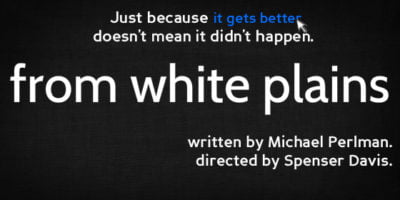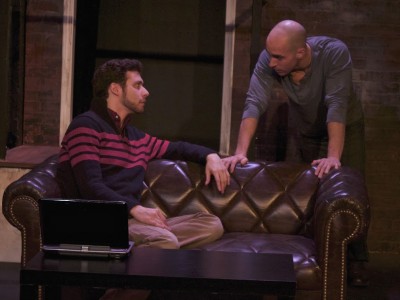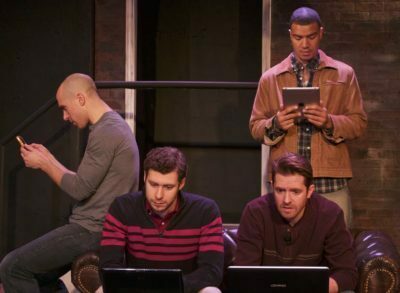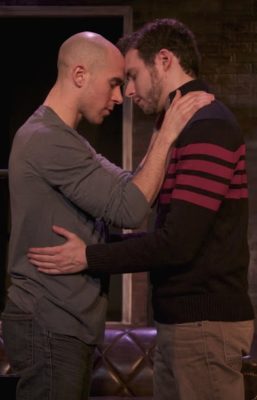From White Plains

By Michael Perlman
In collaboration with
Craig Wesley Divino
Karl Gregory
Jimmy King
and Aaron Rossini
Directed by Spenser Davis
produced by Broken Nose theatre
At the Greenhouse Theatrte, Chicago
Fresh perspective on bullying and its long term effects vividly dramatized
Score one for Broken Nose Theatre for snaring the 2012 drama From White Plains. This sharp drama sheds new light on bullying, vengeance and there consequences for all concerned. Despite being a tad under rehearsed and containing too many repetitious dialogue, From White Plains is a balanced play that works on several levels. Once the cast gets over their opening night jitters, the power of the piece will emerge even stronger that what it contained on their opening.

The press notes state:
“When Dennis Sullivan (David Weiss) wins an Oscar for his film “White Plains,” about a gay teenager who takes his own life after being bullied relentlessly by his high school classmates, he dedicates the award to his late friend Mitchell, whose story the film is based on, before publicly naming the bully whose actions Dennis believes led to his friend’s suicide: Ethan Rice (Adam Soule).
Like millions of people around the world, the now-grown Ethan is watching the Oscar telecast that night and is blindsided when he is deemed culpable in the death of a fellow student he barely remembers. Over the next week, Ethan becomes the target of a nationwide anti-bullying campaign, a campaign that quickly spirals out of control, changing not only his and Dennis’ lives but also the lives of the people closest to both men.”

That intriguing storyline is presented in balanced arguments as to the the wisdom of continuing the vengeance toward Ethan by Dennis fifteen years after the bullying supposedly caused Mitchell to commit suicide. We see how passionate Dennis is in his attack on bullying through his film and his continuing video encounters with Ethan on social media. Dennis is a zealot while , at first, Ethan tries to state that he is is not now that nasty teen from 15 years ago but a nice guy who regrets doing what he did. But Dennis is relentless making Ethan the poster boy for bullying worldwide.
Dennis is consumed by vengeance and his self-righteous campaign while Ethan’s life crumbles from the stigma of being a bully despite that happening a decade and a half ago. Ethan loses his girlfriend, his job and, eventually, his best friend John (John Overton Lewis III) as his reaction to the publicity leads Ethan to several ill-advised slurs in John’s presence.
As Dennis continues his assault on Ethan (and bullying), his relations with his lover Gregory (Ben Burke) suffers since Gregory feels that Dennis’ passion is so all-consuming that there is no room for Gregory in Dennis’ world.

As this 85 minute one act progresses, the effects on each of the four characters becomes profound as each struggle to make sense of events as they unfold. Can Gregory and Dennis ever be happy together? Can Dennis move on with life or is he doomed to be constantly re-victimized by past events? When is forgiveness warranted? Can one forgive but not forget?
Can Gregory be supportive of his lover without putting him in a either or position: his beliefs or his lover?
Can John forgive Ethan especially when Ethan’s bullying of a gay boy could have been John’s gay brother? Also, did Ethan mean his racial slur or was that simply a stupid unthinking utterance by Ethan?
Is there anything Ethan can do to show remorse for his past bullying or is he doomed to suffer lifelong consequences for his actions when he was a teen? Now at age 30, what is the ultimate price for being a bully when you were 15-18 years old?
What is the moral imperative by Dennis to “out” Ethan now as a bully 15 years ago? Is vengeance ever justified morally? Does the end justify the means?
When Dennis and Ethan meet face-to-face in the green room before their joint TV appearance, Dennis give a powerful monologue about the effects of bullying on himself (and, of course, Mitchell)) and how difficult it is for Dennis to forgive Ethan. This scene makes the entire play worth seeing.
This is a nicely balanced look at all sides of the consequences of both bullying on those who were bullies and those who perpetuated the bullying. From White Plains speaks to the dilemma of balancing righting a wrong without becoming consumed by vengeance. It demonstrates how consequences from our actions can often times create unwanted outcomes. This is a gem of a play that has much to say.
Highly Recommended
Tom Williams
Talk Theatre in Chicago podcast
Date Reviewed: January 31, 2014
For more info checkout the From White Plains page at theatreinchicago.com
